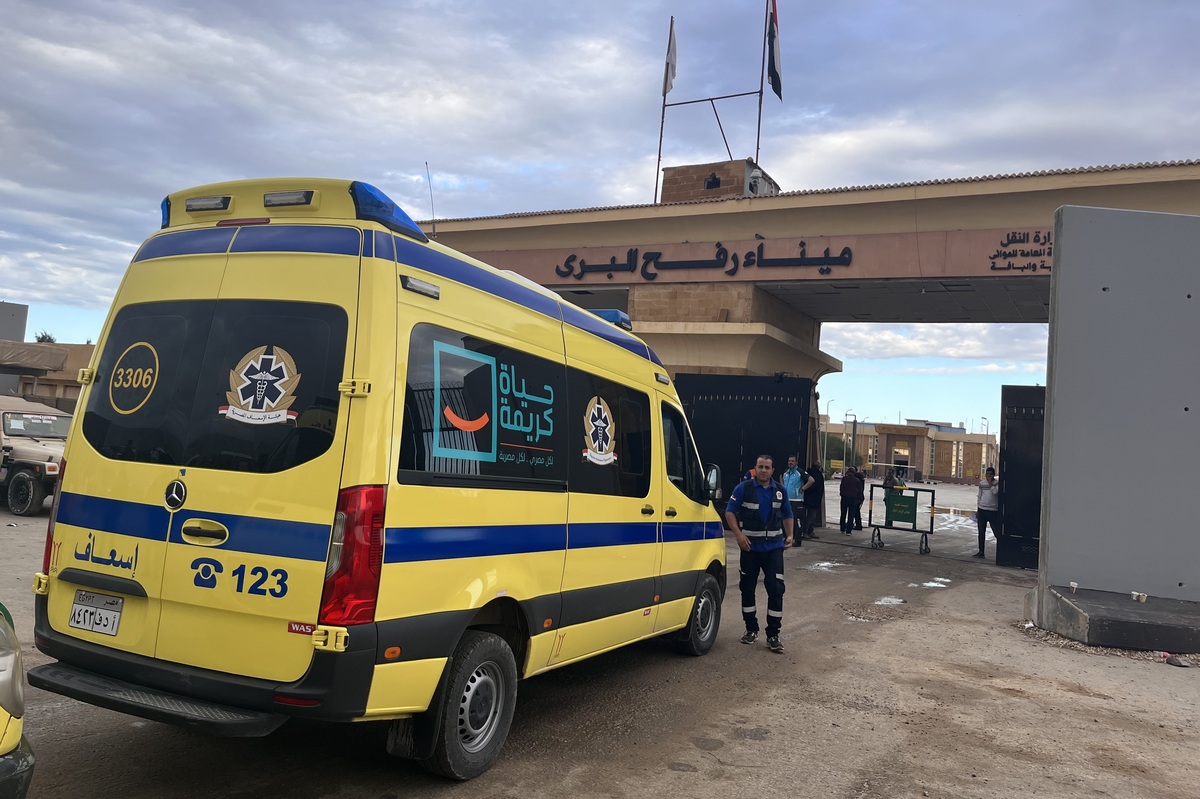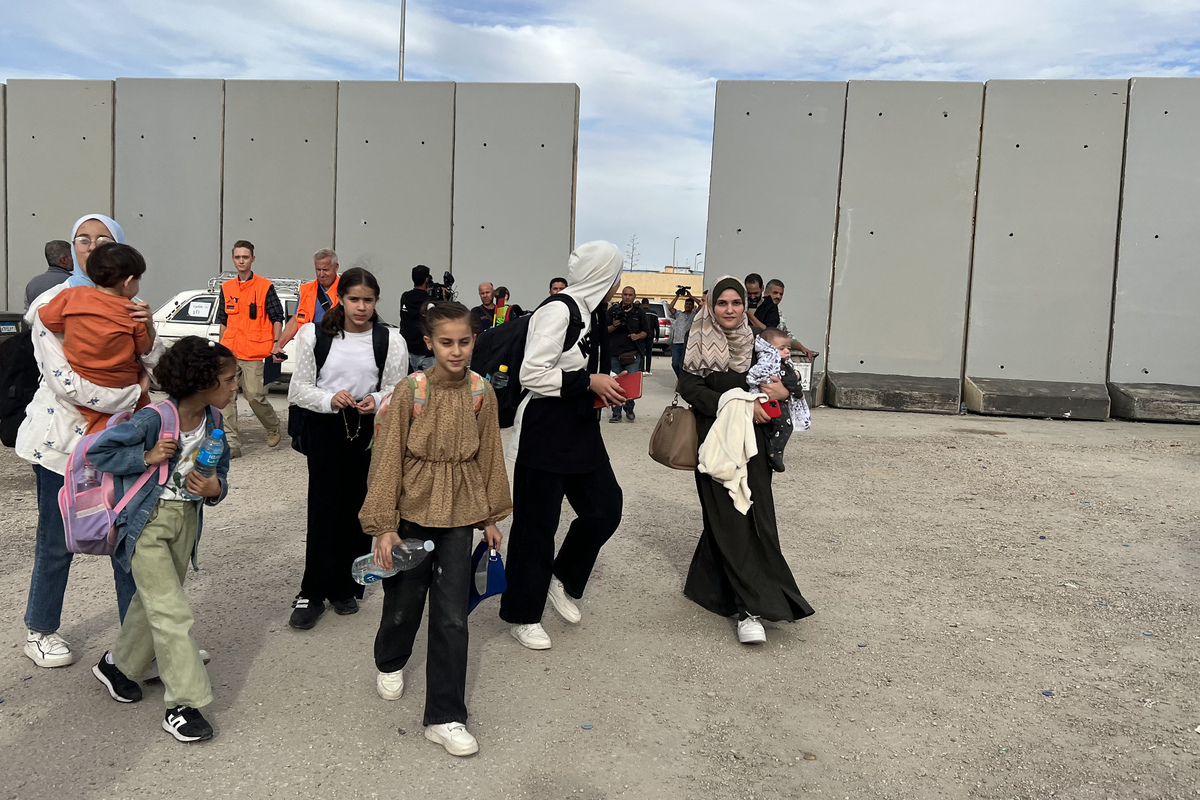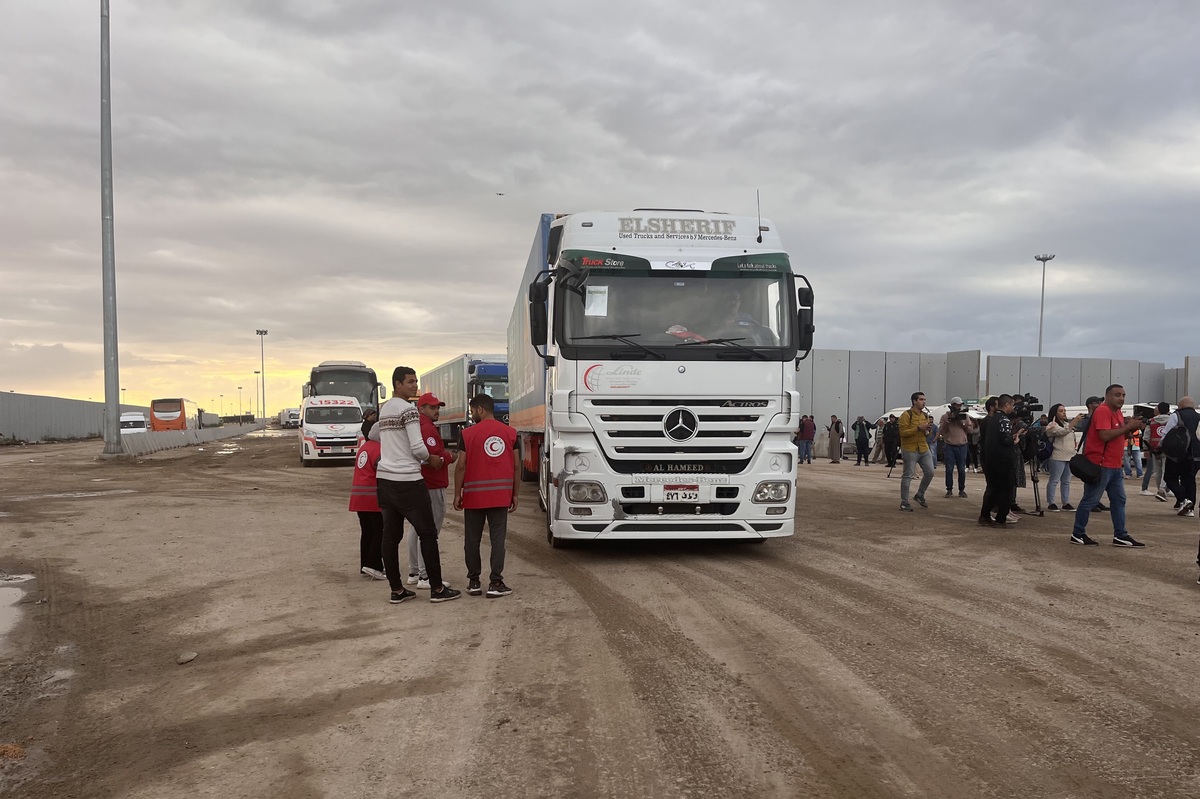An Egyptian ambulance prepares to enter the Gaza Strip on Nov. 15 through the Rafah crossing, to transport critically wounded Palestinians for treatment to Egypt.
Aya Batrawy/NPR
hide caption
toggle caption
Aya Batrawy/NPR


An Egyptian ambulance prepares to enter the Gaza Strip on Nov. 15 through the Rafah crossing, to transport critically wounded Palestinians for treatment to Egypt.
Aya Batrawy/NPR
RAFAH, Egypt — A dusty, remote border crossing on the tip of Egypt’s North Sinai has become the focus of international attention because it is currently the only way in and out of the Gaza Strip.
It’s also possibly where 50 Israeli women and children, held hostage by Hamas since Oct. 7, may walk free from Gaza, following a complex deal between Israel and Hamas, mediated by Egypt, Qatar and the United States. Four hostages previously released from Gaza last month exited through the Rafah crossing, with assistance from the International Committee of the Red Cross.
The Rafah crossing is also the only access point now for aid to enter Gaza, a territory run by Hamas that’s been under an Israeli blockade for more than 16 years and where Egypt has also restricted movement in and out. This makes Rafah a key lifeline for 2.3 million Palestinians trapped inside the Gaza Strip.
Around 1,400 trucks carrying humanitarian supplies have entered Gaza through Rafah over the past month, according to the United Nations Office for the Coordination of Humanitarian Affairs. Aid groups say it’s a fraction of what Gaza needs and a trickle compared to the roughly 10,000 trucks that entered Gaza every month, mostly from Israel, before the war.
Gaza has been under Israeli siege since the Oct. 7 attacks, in which Israel says Hamas-led militants killed some 1,200 people and seized around 240 hostages. Israeli attacks on the Gaza Strip have since killed at least 12,700 people, according to Palestinian health officials.
The Israeli siege of Gaza has cut people off from access to clean drinking water and enough food, as well as the fuel needed to power hospitals, desalination plants, sewage pumps, homes and communication lines.
As part of the deal struck between Israel and Hamas, much more aid may be allowed to enter Gaza through Rafah in the coming days during a pause in the fighting.
Some aid is going into Gaza from Egypt — but not enough
In rare visit to the Rafah border last week organized by Egypt for a small number of journalists, NPR saw large, 18-wheeler trucks carrying food, water and medicine as they slowly passed through the crossing, exiting Egypt.
It’s a roughly six-hour drive from Cairo to Rafah, with several military and security checkpoints along the way.
Some of this aid going into Gaza comes directly from Egypt and some is flown in from around the world, landing at a small logistical airport in the Egyptian city of Al-Arish. That cargo is loaded onto trucks that wait, sometimes for days, before entering Rafah. Delays have happened for a number of reasons, including Israeli shelling and bombardment of Gaza near the border, as well as a lack of fuel or communications lines at times needed to distribute aid inside Gaza.
The head of operations for Egypt’s Red Crescent, Lotfy Gheith, says the Rafah crossing cannot keep up with the overwhelming scale of Gaza’s humanitarian crisis. His team of volunteers and staff, wearing bright-red vests at the Rafah border and Al-Arish airport, are overseeing aid efforts in Egypt.
He says Gaza’s 1.5 million displaced people require more than 9 million liters of drinking water per day. A large UNICEF truck carrying boxes of water bottles crossed into Gaza on the day NPR visited the crossing, but the truck was carrying barely enough drinking water for a few thousand people.
The Red Crescent has started sending jerrycans with water filters for people in Gaza because “providing this huge number of water and a limited number of trucks” is very difficult, Gheith says.


Palestinian dual nationals arrive on the Egyptian side of the Rafah border crossing with the Gaza Strip on Nov. 22.
Rania Sanjar/AFP via Getty Images
hide caption
toggle caption
Rania Sanjar/AFP via Getty Images


Palestinian dual nationals arrive on the Egyptian side of the Rafah border crossing with the Gaza Strip on Nov. 22.
Rania Sanjar/AFP via Getty Images
It is “impossible,” Gheith says, to try and provide 2.3 million people in Gaza with enough drinking water through trucks from Rafah every day.
Rafah is currently the only exit for foreigners and some critically wounded people
As humanitarian aid trucks slowly make their way into Gaza, another gate at Rafah is reserved for people departing the besieged territory.
Among the few thousand Palestinians with foreign passports who’ve been allowed to leave for safety abroad are a mother and her teenage boys. They have just crossed into Egypt, and are dragging suitcases packed with whatever clothes they could grab after their house was bombed and the rubble collapsed on them.
Dazed and exhausted, the woman prefers to give only her first name, Hanan. She says her families’ livelihood and memories remain in Gaza.
She breaks into tears when asked who she’s leaving behind.
“My parents,” she says, sobbing. Her youngest son hugs her, tries to make her laugh, but she’s despondent. “There’s no hope in life,” she says as she wipes her tears and makes her way toward a waiting car.
Some 400 Palestinians out of an estimated 30,000 wounded in the war have been able to leave Gaza for medical treatment in Egypt over the past few weeks. Brightly colored yellow and blue ambulances carry patients through the crossing.
This week, Egyptian ambulances carried 28 premature babies through Rafah to hospitals in Egypt, but not before eight others had already died in Gaza. The babies were all removed from their incubators in Al-Shifa hospital after it ran out of fuel for its generators and was forced to evacuate patients and staff during an Israeli raid.
Egypt, however, has not opened its border for all Palestinians to leave Gaza, fearing it could lead to a permanent displacement of refugees in North Sinai and draw Israel and Egypt into direct conflict.
An Egyptian border where Israel holds sway
Israel approves the names of Palestinians leaving the Gaza Strip, including the roughly 400 critically wounded permitted to leave for treatment in Egypt in past weeks.
Israel also inspects every truck that enters Gaza through Rafah at another checkpoint further south, adding to the backlog of getting aid in. Israel says the checks are needed to ensure no weapons enter Gaza.
Despite pleas for weeks by Egypt for fuel and more aid to enter Gaza, it took two weeks from the start of the war for Israel to agree on the first 20 trucks of aid to enter through the Rafah crossing on Oct. 21. It came after a visit by President Biden to Israel, in which he urged that aid be allowed into Gaza.
It was also only last week, on Nov. 18, that Israel permitted fuel to enter Gaza for the first time since the start of the war, despite Egypt’s readiness to deliver fuel much sooner through Rafah.


Egyptian Red Crescent volunteers and staff stand near Egypt’s Rafah border crossing as trucks carrying humanitarian aid wait to enter the Gaza Strip on Nov. 15.
Aya Batrawy/NPR
hide caption
toggle caption
Aya Batrawy/NPR


Egyptian Red Crescent volunteers and staff stand near Egypt’s Rafah border crossing as trucks carrying humanitarian aid wait to enter the Gaza Strip on Nov. 15.
Aya Batrawy/NPR
Egypt’s President Abdel-Fattah el-Sisi has said that Israel’s siege of Gaza is aimed in part at pushing Palestinians into the Sinai Peninsula. The U.S. and other Arab states have also publicly rejected the transfer of Palestinians to Sinai as a possible solution to the crisis. This fear, however, has underpinned Egypt’s position that more aid needs to urgently enter Gaza.
U.N. agencies say much more aid is needed
The United Nations says far less than half of the 200,000 liters of fuel a day it needs to distribute food and other aid is entering Gaza under the latest Israeli rules.
U.N. humanitarian relief chief Martin Griffiths has called on Israel to open one of its border crossings with Gaza so more aid can reach people.
“People need to know that there will be aid coming tomorrow or the next day,” he said, adding that around 60% of trucks entering Gaza before the war used to pass through Israel’s Kerem Shalom border during the years of blockade.
“So please, Kerem Shalom. Please Israel, give us that for our crossing point,” Griffiths said in comments to reporters last week in Geneva.
The U.N. relief agency that aids Palestinians, UNRWA, says it is distributing aid that is coming into Gaza, including flour, canned food, mattresses, tents and other basic supplies.
“But it is NOT sufficient to meet the needs of hundreds of thousands of people- we need more, NOW,” the agency said Tuesday in a post on X, the site formerly known as Twitter.
This story originally appeared on NPR


